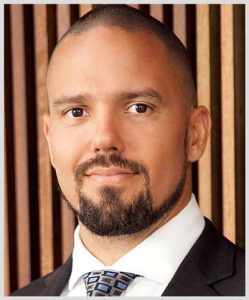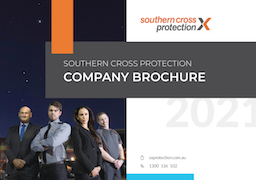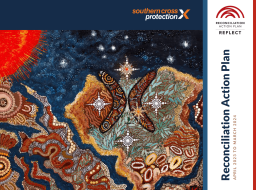by Ben Beville, Risk Advisor, Southern Cross Protection
Why do you work in security? Is it a job or a higher calling? Does it merely pay the bills, or does it serve some greater purpose? Who cares if you’re good at what you do? Why do we need good security? Why does any of it really matter?
I’d like to take you on a brief philosophical digression which I hope will lead to dialogue about why I believe your job matters, regardless of what you do within our security industry. Although my goal is ultimately to influence advancements to National Security by raising awareness about the civilian role within that framework, you may find some very practical applications relevant to other aspects of your business or your life. It begins with a story.
Years ago, secluded in an East African desert during a particularly testing military deployment, I stumbled across an idea that radically transformed every aspect of my life: my attitude, motivation, priorities, relationships, career, and even faith. I was on the rebound from an eight-year lifetime low, with a new family on the horizon, having achieved so much yet so little, seemingly imprisoned within an existence I didn’t understand. It was well and truly a full-fledged existential crisis.
Locked up inside a little fortress of solitude I had built for myself, I eventually found the answers I was looking for. In short, it occurred to me that all living creatures appeared to share a common purpose. I observed that the life of every living thing since the advent of life on Earth has either succeeded or failed in achieving only one, single contribution of significance to the rest of the world: to evolve. If enough individuals achieve successful evolution, the group at large will endure. If enough individuals fail, the group at large becomes endangered or extinct. The only way to effectively measure an individual’s success is to view it in the context of many generations. Therefore, the success of progeny becomes more important than the individual’s, per se.
Was it possible that for any individual—of any species, not just humans—success in the grand scheme could not be measured through isolated achievements, but rather through the degree of evolution achieved over the lifetime of that individual and its progeny? Over the course of an entire lifetime, how well did that individual survive? How well did it adapt to changing environments? How much did it contribute to the survival and advancement of others? How much did it evolve and contribute to the evolution of its species? What did it leave behind?
I found this notion applied also to any social group. Companies, by the way, are a group of individuals, so I believe this is equally relevant to your business. Why does your business exist? If the answer is simply “to make money”, then the business is not likely to last. It can’t. The only way your business can last is if it contributes to society’s need to survive and evolve. The more people you help, the more successful your business will be.
There is one essential factor which I’ve found will either promote or inhibit the success of individuals and social groups, more than any other: security. You may be familiar with Abraham Maslow’s, Hierarchy of Needs. Maslow found that after meeting all our essential physiological needs such as food, water, and shelter, the next tier of most important needs related to our safety: security of body, employment, resources, morality, family, health, and property. Furthermore, modern Neuroscience teaches us that a brain under constant fear and stress is incapable of peak performance. We can conclude then that security is essential for a highly successful life. It may be that the success of our legacy is more important than our personal success, but without good security, neither is possible.
Australians take good security for granted. That’s not a criticism, by any means. That’s a beautiful thing. It’s why I migrated here. After seeing much of the world, I concluded that this was the very best place on Earth for me to settle down and build a family. There is a certain je ne sais quoi which is ubiquitous in Australian life and provides all the foundations for an ideal, advanced society; I’ve not seen this anywhere else in the world. My sense is that this allure is inextricably linked to the cultural tendency by most Australians to feel secure in their environment.
Australia has problems, of course, but not really. Syria has problems; Iraq has problems; Somalia has problems. In 2015, Australia had four cities ranked Top 10 in the EIC Global Liveability Report. In 2016, 29 cities received worse scores due to fear of terrorism, and Sydney dropped off the Top 10 list I’d speculate due to housing affordability; three Australian cities remained in the Top 10. Your typical Aussie works hard during the week, enjoys the weekend, has access to better food and coffee than anywhere else I’ve ever been, has access to great healthcare and education, is very conscious about fitness and nutrition, and is very interested in general wellness and personal growth. Australians don’t really stress much about anything: “she’ll be right mate”. I would posit that it’s because Australians feel so safe that they’re then able to focus on making the most out of life. Taking good security for granted is in my view an essential enabler of the Australian way of life.
If Australia is at one extreme of the spectrum, what does the opposite extreme look like?
I grew up in Costa Rica, an impoverished country where regardless of social status, everybody lives in a steel cage. You don’t walk outdoors after dark—to do so will invite violence against you. Despite strict gun laws, criminals have no problem arming themselves. Police and the Judiciary are corrupt and incompetent. My childhood homes were burglarised two dozen times. We had many guard dogs over the years, but they all died from either disease, poison or bullets. At age 10, I was mugged and beat up by four thugs 25-metres from my front door. At age 16, I caught a burglar in our home in the middle of the night; during the scuffle, my elderly father sustained a serious injury and never properly walked again. He would eventually pass away from health conditions directly attributable to the stress of living decades without satisfying his fundamental need for good security.
By the time I was 18, I didn’t need an epiphany to know I had no future there, so I moved to the U.S. and joined the military. Throughout my career I had many opportunities to see the world. I worked in places where honest people struggled to satisfy even their bare necessities for food and shelter. Their survival was constantly threatened by disease, crime, piracy, or war. The curious phenomenon about some of these places was that culturally, it seemed to me, human life had no value—life was almost disposable. In those environments, there was no opportunity to think about posh things like personal development, education, or even future.
In environments where security is inadequate to meet the threats, very few people can achieve anything significant in life. People’s primary focus is survival, and they survive for a time, but eventually they die, leaving their progeny to endure the same struggles. It’s incredibly difficult to break that cycle.
Good security is important because it shapes the environment where everyone must achieve his or her purpose. If you don’t have to worry about your survival or the survival of your loved ones, it allows you to focus your resources towards other, more productive endeavours: getting a good education; growing your business; developing your untapped potential; spending quality time with your family; enjoying life. When you’re able to take good security for granted, you can do all these things.
This is where we as security professionals come in: our role is to protect the members of our social groups so that they can continue to take good security for granted. This will create the environment that empowers our society to achieve collective success.
In today’s world, good security and higher evolution require money. If you don’t believe me, go preach fitness and nutrition to a homeless person who hasn’t eaten all week; talk about education to a teenager who lives in a slum and continuously misses school due to preventable diseases; or talk about self-actualisation to a single parent who works two full-time jobs and still struggles to provide for her children. The same is true for businesses; for businesses to evolve, there must be a commercial incentive, and indeed I believe there is.
It might make more sense to look at evolution in terms of Earning Before Interest & Tax (EBIT). Increasing EBIT is notionally simple: drive sales up and costs down. You might agree that there is a limit to how much you can cut costs before you begin shrinking your business, delivering shoddy products or services, and running into staff turnover problems. You can, for instance, reduce cost of goods, reduce overheads, reduce wages, reduce people, demand more sales. In that classical approach, either the business will fail, or the business will succeed at the expense of its people. That might work for a time, but in most cases, it can’t yield sustainable growth; whether it does or it doesn’t, it invariably promotes a toxic culture that cannibalises the people who work there.
Consider a different model, if I may—and this is by no means a “new thing” I’ve come up with all on my own. As a sanity check, I perused through a Business Insider article from April 2016, “The 50 best companies to work for in America,” looking for companies who have figured this all out without my insights: Apple, ExxonMobil, Ford, Texas Instruments, 3M, Kimberly-Clark, DuPont, Dow Chemical, Intel, Motorola, eBay, Expedia, Cisco Systems, American Express, Pfizer, Microsoft, Chevron, Johnson & Johnson, Microsoft, Symantec, Google, and many others.
All 50 companies on that list invest heavily in innovation, efficiency, skill, job satisfaction, and staff wellness: key ingredients for the evolution of people and businesses. Across the board, the operating costs go up, unbelievably so, but the human cost is low. The net result is increased productivity, skill, quality, and passion; and if you’ve ever spent more than a day in sales, you’ll quickly note that all these things together lead to increased revenue. Because all the companies surveyed by Business Insider were Fortune 500 companies, we can deduce this has had a positive impact on their EBIT.
My message is this:
- Whether you’re a person or a business, I believe with great conviction that your job serves a purpose far greater than yourself.
- To achieve that purpose, you must continually stand strong in the face of adversity, adapt to new environments and threats, challenge the status quo, and strive for continual self-improvement.
- Good security is the quintessential element that makes large-scale growth possible, and it’s the very cornerstone of the Australian way of life.
As security professionals, it’s our social responsibility to ensure everyday Australians can continue to take good security for granted. You may have an opinion that nothing terrible will ever happen here because nothing ever has, so there’s no reason to do anything different. I respect that this opinion is statistically justified. I sense, however, there is a growing number of us who read the writing on the wall and identify more with the famous words of Lord Eddard Stark, “winter is coming.”
Evolution is in our case not a random process, but rather a deliberate choice… So, my final question for you is: what choice will you make?
 About the Author
About the Author
Ben Beville is a Risk Advisor with Southern Cross Protection. He was formerly a Lieutenant Commander in the US Navy, where he served for 11 years. During his time in the US Navy he completed multiple deployments to Africa and the Middle East.






